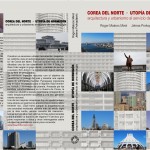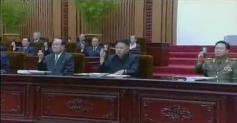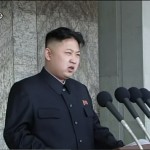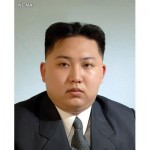Below I have posted links and excerpts of stories related to the launch of the Unha-3 rocket in April 2012. Here is the Wikipedia page
__________________
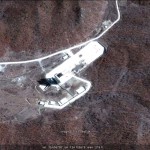
Pictured above (Google Earth): (L) The Sohae Satellite Launching Station (AKA Tongchang-ri launch facility) in Cholsan County, North Pyongan Province–site of the “Kwangmyongsong-3 launch”
UPDATE 48 (2012-5-2): The UNSC sanctions three additional DPRK organizations. See UNSC documents here, here, and here.
According to the AP (via Washington Post):
The U.N. Security Council ordered all countries Wednesday to freeze the assets of three North Korean state-owned companies to punish Pyongyang for its failed rocket launch last month.
The April 13 long-range launch, which Pyongyang called a failed attempt to put a satellite into space, violated earlier Security Council resolutions prohibiting North Korea from engaging in nuclear and missile activity. The rocket broke into pieces shortly after liftoff.
The Security Council’s committee that monitors sanctions against North Korea approved the sanctions Wednesday and ordered all countries to freeze the assets of the three companies. The European Union, U.S., Japan and South Korea proposed additional entities for sanctions, but the committee acts by consensus and China, North Korea’s closest ally, only approved the three companies.
U.S. Ambassador Susan Rice told reporters the three companies are “very much involved in … illicit missile and nuclear programs.”
The three sanctioned companies — Green Pine Associated Corporation, the Amroggang Development Banking Corporation and The Korea Heungjin Trading Company — play a role in financing, exporting and procuring weapons, the U.S. Mission to the U.N. said in a statement.
Green Pine is responsible for about half of the arms and weapons exported by North Korea, the U.S. statement said. Amroggang Development Banking is managed by Tanchon Commercial Bank, which is “the main North Korean financial entity for sales of conventional arms, ballistic missiles and goods related to the assembly and manufacturer of such weapons,” the statement added. It described Korea Heungjin as a trading company that has been used to procure an advanced digital controller with applications in missile design.
Rice said the sanctions committee also approved additional items and technology that are prohibited for transfer to or from North Korea on two key lists dealing with missiles and nuclear-related material, and approved a new work plan for the committee’s panel of experts aimed at intensifying efforts to monitor and improve the implementation of sanctions.
The Missile Technology Control Regime, a group of 34 countries, monitors the transfer of missile equipment, material and related technologies that can be used to deliver weapons of mass destruction. The Nuclear Suppliers Group comprises countries that have established export rules to prevent the proliferation of nuclear weapons. Both list items banned for export; they were last updated in 2009.
“The committee’s package of new measures constitutes a serious and credible response to North Korea’s provocation,” Rice said in a statement. “These measures will increase North Korea’s isolation and make it harder for Pyongyang to move forward with its illicit programs.”
The Security Council unanimously approved a presidential statement on April 16 strongly condemning the failed rocket launch. The council gave the sanctions committee, which includes all 15 council members, 15 days to prepare new additions for the sanctions list.
The European Union proposed about 40 additions to the sanctions and the missile and nuclear lists, and the United States, Japan and South Korea also submitted lists, diplomats said, speaking on condition of anonymity because talks have been private.
China did not respond until just before the deadline Tuesday night, and approved sanctions against the three companies and updates to the two lists, the diplomats said.
It was third time in six years that the Security Council imposed sanctions against North Korea. The council blacklisted eight entities — six trading companies, a bank and the General Bureau of Atomic Energy — and five individuals after North Korea’s nuclear tests in 2006 and 2009.
UPDATE 47 (2012-4-30): Reuters reports:
The United States, South Korea, Japan and European nations have submitted to the U.N. Security Council’s North Korea sanctions committee lists of individuals and firms they want blacklisted after Pyongyang’s recent rocket launch, envoys said on Monday.
Earlier this month the 15-nation council strongly condemned North Korea’s April 13 rocket launch, called for adding new names to the list of those hit by existing U.N. sanctions and warned Pyongyang of further consequences if it carried out another missile launch or nuclear test.
“So far the United States, European council members, South Korea and Japan have proposed new designations ahead of tomorrow’s midnight deadline (to agree on new names),” a council diplomat told Reuters on condition of anonymity.
It was not immediately clear which firms and individuals the council would blacklist, assuming it reached agreement.
The Security Council imposed sanctions on Pyongyang in response to its 2006 and 2009 nuclear tests.
China, North Korea’s protector on the Security Council and a permanent veto-wielding member, also backed the council’s “presidential statement” from two weeks ago, ensuring its unanimous adoption. The statement gave the council’s North Korea sanctions committee 15 days to propose new sanctions listings.
“That deadline might be extended for a few days to give China a little more time to think about the proposed designations,” another council diplomat said. The deadline for agreement is midnight EDT on Tuesday (0400 GMT on Wednesday).
“It looks as if China won’t stand in the way of an agreement (on expanding the sanctions list) though they won’t necessarily accept adding all the proposed individuals and entities,” he added. Several other Western diplomats said they also expected China would agree to an expansion of the U.N. blacklist.
Diplomats say that if the committee can agree on adding new names to the blacklist, it will be a further sign of Beijing’s irritation with its hermit neighbor over a satellite rocket launch North Korea had been widely urged not to carry out.
The North Korea sanctions committee includes all 15 council members. It works on the basis of consensus, which means any individual council member can block agreement.
The U.N. blacklist includes individuals facing international travel bans and asset freezes, companies whose assets are to be frozen and goods that North Korea is not allowed to export or import.
The current list includes eight companies and five individuals. Under two Security Council sanctions resolutions from 2006 and 2009, North Korea is barred from importing nuclear and ballistic-missile technology, as well as luxury goods.
UPDATE 46 (2012-4-20): Global Security reports “Panetta: China Assisted North Korea Missile Program”:
This week U.S. Defense Secretary Leon Panetta said China has provided some assistance to North Korea’s missile program, possibly violating U.N. sanctions on the country.
Beijing has denied the allegations, but Panetta says that China must do more to bring North Korea to the negotiating table.
“We’ve made very clear to China that China has a responsibility here to make sure that North Korea — if they want to improve the situation with their people, if they want to become a part of the international family, if they, in fact, want to deal with the terrible issues that are confronting North Korea, there’s a way to do that,” he said. “And China ought to be urging them to engage in those kinds of diplomatic negotiations. We thought we were making some progress and suddenly we’re back at provocation.”
Beijing has long been Pyongyang’s most important backer, providing key economic support and acting as an international advocate during times when tension escalates between Pyongyang and other countries.
Mike Chinoy is a Senior Fellow at USC’s U.S.-China Institute and has traveled to North Korea 15 times. He says there are signs that despite the close ties between the two, China may be re-evaluating its relationship.
“I think Beijing has been taken aback by the North Korean decision to stage the satellite launch and by the generally tough and somewhat truculent tone that the North Koreans have adopted. It’s a problem for the Chinese, because they don’t really like what the North Koreans are doing,” Chinoy explained.
…
UPDATE 45 (2012-4-17): KCNA publishes the DPRK’s denunciation of the UNSC presidential statement and announces the scrapping of the “leap day deal“. See the KCNA article here. South Korean Unification Minister, Yu Woo-ik, announced the ROK will continue humanitarian aid.
UPDATE 44 (2012-4-16): U.N. condemns North Korea rocket launch. According to the Associated Press:
The U.N.Security Council on Monday strongly condemned North Korea’s rocket launch, announced it will impose new sanctions, and warned that it will take further action if Pyongyang conducts another launch or a new nuclear test.
A presidential statement, approved by all 15 council members and read at a formal meeting, said Friday’s launch, “as well as any use of ballistic missile technology, even if characterized as a satellite launch or space launch vehicle, is a serious violation of U.N. resolutions.”
The Security Council adopted a resolution imposing sanctions against North Korea after its first nuclear test in 2006, and stepped up the sanctions after its second test in 2009.
The Security Council demanded Monday that North Korea halt any further launches and said Friday’s launch “has caused grave concerns in the region.”
U.S. Ambassador Susan Rice, the current council president, said the speedy adoption of the statement “shows that the international community is united” in sending a strong message to North Korea and said its companies dealing in nuclear technology would be added to the sanctions list.
The council said it asked the Security Council committee monitoring sanctions against North Korea to prepare new additions for the sanctions list within 15 days, and said if it doesn’t the council itself would take action within five days to expand the sanctions list.
The council expressed “its determination to take action accordingly in the event of a further DPRK launch or nuclear test,” the statement said, using the initials of the Democratic People’s Republic of Korea.
You can read the UNSC Presidential Statement here (PDF). You can also read it on the UNSC’ press release on the topic.
The New York Times also reports:
The rocket failure had raised conjecture that the North Korean leadership might embark on a purge to assign blame. But video footage from a large military parade on Sunday in Pyongyang showed that two party officials in charge of the North’s defense industries — Pak To-chun, party secretary for munitions industries, and Ju Kyu-chang, director of the party’s department for machinery industries — were present in their military uniforms.
Another important official connected to the North’s nuclear and missile programs, Paek Se-bong, head of the country’s Second Economic Commission, retained his seat on the country’s powerful National Defense Commission.
Also on Monday, Choson Sinbo, a pro-North Korean newspaper in Japan that often speaks for the North’s government, said North Korea would embark on developing a rocket much bigger than the Unha-3, the rocket that disintegrated Friday a few moments after liftoff.
The Unha-3 took off from a new launching pad near the western border with China. Experts who have examined the site through satellite imagery have said it was designed for bigger rockets than the Unha-3.
See previous posts below…
Read the rest of this entry »

